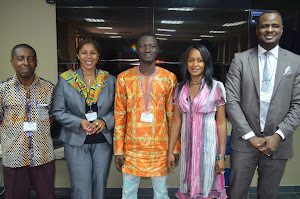By Edmund Smith-Asante
 |
| Mr Evans Manu |
A Research Scientist at the Water
Research Institute (WRI) of the Council for Scientific and Industrial Research
(CSIR), Mr Evans Manu, has stated that groundwater remains the only hope for
Ghana for the provision of potable water for the population as most of the
country’s surface waters have been polluted.
Mr Manu was speaking to the Daily
Graphic after he had presented a proposal to conduct extensive research on the
River Pra Basin at an ongoing in-house review seminar being organised by the
CSIR.
Study of Pra Basin
He explained that the proposed study
would look at the impact of human activities on the water resources, especially
the groundwater resources in the Pra Basin, citing some of the activities as
mine dewatering when open-cast mining was practised, mass cocoa spraying, the
use of inorganic fertiliser on farms, and ‘galamsey’.
“Water will definitely recharge
groundwater aquifers; the ‘galamsey’ operations are destroying water bodies.
Whatever affects the surface water also affects the groundwater so we want to
know the chemistry between all these anthropogenic activities that are
affecting our groundwater sources.”
According to Mr Manu, the research
would employ a three-D model to know how much water Ghana had within the basin,
how much was being abstracted, then draw the water budget.
 |
| Some of the participants at the training |
He noted that the demand for
water in the basin was so much, and that was why Obuobi et al. predicted that
by 2020, the water resources in the basin would be scarce and that by 2050 the
scarcity would upscale to absolute scarcity.
Protection of country’s groundwater
He recommended that to protect the
country’s groundwater sources, the best thing would be to look at current
practices, especially fertiliser application and the nature of the rocks where
they were applied, because if they were very soft and highly fractured
“definitely there is the possibility of these chemicals getting into our
groundwater.”
For his part, Dr Anthony Duah, a
Research Scientist with the Groundwater Division, WRI, who presented the
findings of a research conducted on the potential of groundwater in the
Northern Region, said it was found that out of the 4,312 boreholes sunk between
1985 and 2012, only 1,099 were covered with proper water quality data.
Study of Northern Region groundwater
Dr Duah said what informed the
research conducted from 2011, was the need to have adequate data on groundwater
in the region to be able to give accurate information to guide the sinking of
boreholes.
The objective was to assess the
availability, quantity, quality, suitability as well as the sustainability of
groundwater resources for domestic water supply and industrial purposes. It was
also meant to develop single-parameter groundwater use maps to show spatial distribution
and variation of groundwater characteristics in the region.
Dr Duah said the findings included a
high potential for the development of groundwater resources of the Northern
Region in spite of the uneven distribution of the resource, and added that the
average success rate of boreholes in the region was 60 per cent.
The research also showed that about
62.4 per cent of the population are served by the over 4,300 boreholes
inventoried, which had an average depth of 49.7 metres instead of the ideal 100
metres or more.
“Research has shown that boreholes
should have a depth of 80 to 100 metres. We recommend that at least you try 100
metres; sometimes you also go a little further.
“The boreholes generally have good
quality and, therefore, suitable for domestic and other uses except for a few
with high fluoride, iron, manganese and chloride in Gushiegu/Karaga,
Savelugu/Nanton and Zabzugu,” Dr Duah noted.
This
story was first published by the Daily Graphic on April 9, 2016





No comments:
Post a Comment